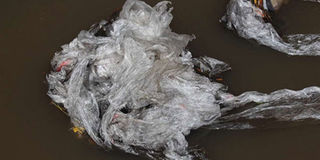TV series on wildlife deaths from plastics keeps UK viewers in thrall

Plastic waste in Nairobi River on October 2, 2019. The world is beginning to tackle plastic pollution. PHOTO | FILE | NATION MEDIA GROUP
What you need to know:
- It estimated that plastic items totalling more than 150 million tonnes are drifting in the world’s oceans, killing one million birds and 100,000 sea mammals each year.
- British people are now generally more aware of the plastic problem and some retailers are taking serious steps to solve it.
It was as scary as anything you might expect to see in the wild – two adult male elephant seals, each weighing 3,000 kilos and standing five metres high, fighting for tribal supremacy.
The ground seemed to shake as they hurled their massive bodies against each other, fangs exposed, their rubbery brown hides slowly turning red with blood.
The film was part of the BBC TV’s "Blue Planet II" natural history series, guided by the renowned broadcaster Sir David Attenborough, which is currently holding Britain in thrall on Sunday evenings.
To fighting seals add a horned viper, the tip of whose tail looks like a juicy spider, attracting unwary birds; sea anemones, anchored immobile to the sea floor, who nevertheless trap and eat a jelly fish; a penguin swimming for its life from a leopard seal; fish leaping out of the waves to catch low-flying sea birds; shivering snub-nosed monkeys from Eastern China huddling together to stay alive in the cold.
The scenes we watched were amazing, sometimes horrifying, but they showed wildlife doing what wildlife does.
PUBLIC AGENDA
What was truly sad was a clip showing albatrosses feeding their chicks with a diet of plastic, which would surely doom them to die.
A scientist picked through the plastic objects and fragments that had been found in the carcasses of such victims – grocery bags, a tooth pick, ear-cleaning cotton buds, bottle tops, game counters, coffee cups, cutlery, toy soldiers and fast-food boxes.
Attenborough’s series estimated that plastic items totalling more than 150 million tonnes are drifting in the world’s oceans, killing one million birds and 100,000 sea mammals each year.
The situation was highlighted last week when Attenborough and the BBC’s Natural History Unit were announced as winners of the prestigious Chatham House Prize for their ‘Blue Planet’ series.
Chatham House director Robin Niblett said they had “played an instrumental role in putting the issue at the forefront of the public agenda”.
WASTE DISPOSAL
British people are now generally more aware of the plastic problem and some retailers are taking serious steps to solve it, such as banning plastic drinking straws, offering paper, multiple-use carrier bags and introducing re-usable coffee cups.
Attenborough, for his part, agrees that the world is beginning finally to tackle plastic pollution. “I think we’re all shifting our behaviour,” he said.
“We are changing our habits and the world is waking up to what we have d one to the planet.”
What was needed now were techniques for disposing of plastic waste.
The “horrid”, “vile” substance had only been invented a hundred years ago, he said, so “surely if we can invent it, somebody somewhere is going to be able to deal with it.”
* * *
In August of last year, Prime Minister Boris Johnson, then Foreign Secretary, wrote a supposedly humorous column saying heavily veiled Muslim women looked like “letterboxes” and “bank robbers”.
To suggestions that this was bad taste at best, insulting or provocative at worst, his defenders reacted as one: “Oh no,” they chortled. “That’s just Boris, having his little joke.”
No joke for British Muslims, however. In the week after his article was published, anti-Muslim incidents in Britain quadrupled to 38 from eight the previous week.
That Islamophobic attacks can be fuelled by the written word was further proven last year when a white supremacist launched a campaign entitled ‘Punish a Muslim Day’, calling for violence against Muslims.
It resulted in waves of malicious letters being sent to mosques, Muslim households and places of work.
And a Muslim monitoring group, Tell MAMA, found that 37 offline anti-Muslim incidents directly referred to the ‘Punish a Muslim Day’ campaign.
David Parnham, 36, of Lincoln, author of the campaign, was jailed for 12-and-a-half years after admitting charges of soliciting murder, encouraging crime and sending letters with intent to cause distress.
* * *
On a lighter note:
Fire and brimstone preacher: “There will be weeping and wailing and gnashing of teeth.” Old lady: “What if you don’t have any teeth?” Preacher: “Teeth will be provided.”
* * *
A sceptic is talking to God. “God, how long is a million years?” God: “To me, only a minute.” Sceptic: “How much is a million dollars?” God: “To me, only a penny.” Sceptic: “May I have a penny?” God: “Sure, just wait a minute.”
* * *
The Sunday School teacher asks her class of children, “Why is it necessary to be quiet in church?” Johnny pipes up: “Because people are sleeping.”





